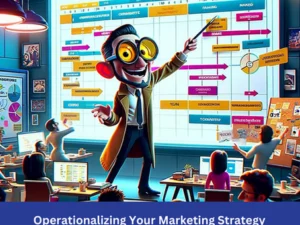In the ever-evolving realm of business-to-business (B2B) marketing, content has emerged as a formidable force, driving engagement, nurturing leads, and fostering trust among decision-makers. As B2B buyers increasingly turn to digital channels for research and information, content marketing has become a cornerstone strategy for businesses seeking to establish thought leadership, showcase expertise, and drive meaningful connections with their target audience. Here’s why content marketing holds immense power in the B2B landscape:

Educating and Informing
In the complex world of B2B transactions, buyers are often tasked with making informed decisions that have significant implications for their organizations. Content marketing enables businesses to provide valuable insights, industry trends, and educational resources that help buyers navigate challenges, understand emerging technologies, and stay ahead of the curve. Whether through whitepapers, case studies, blogs, or webinars, educational content establishes credibility and positions businesses as trusted advisors in their respective fields.
Building Trust and Credibility
Trust is the cornerstone of any successful B2B relationship. Content marketing allows businesses to build trust by consistently delivering high-quality, relevant content that addresses the needs and pain points of their target audience. By sharing expertise, best practices, and success stories, businesses can demonstrate their industry knowledge, track record, and commitment to customer success, fostering trust and credibility among potential buyers.
-
Generating Leads and Driving Conversions Content marketing serves as a powerful lead generation engine in the B2B landscape. By creating compelling, value-driven content, businesses can attract and engage prospects at various stages of the buying journey. Whether through gated assets such as e-books, guides, or reports, or through thought leadership content distributed via social media or email, content marketing enables businesses to capture leads, nurture relationships, and guide prospects through the sales funnel towards conversion.
-
Fueling Search Engine Visibility In an increasingly competitive digital landscape, search engine visibility is paramount for B2B businesses looking to reach their target audience. Content marketing plays a crucial role in improving organic search rankings, driving website traffic, and increasing brand visibility. By creating keyword-optimized, relevant content that addresses common search queries and pain points, businesses can enhance their online presence and attract qualified leads actively searching for solutions.
-
Supporting Account-Based Marketing (ABM) Account-Based Marketing (ABM) has emerged as a strategic approach for B2B marketers to target high-value accounts and personalize their marketing efforts. Content marketing plays a pivotal role in ABM by enabling businesses to create tailored, personalized content that speaks directly to the needs and interests of specific accounts. Whether through customized reports, executive briefings, or personalized email campaigns, content can be leveraged to engage key stakeholders within target accounts and drive meaningful conversations.
-
Facilitating Thought Leadership and Influence Content marketing empowers businesses to establish thought leadership and influence within their industries. By sharing valuable insights, innovative ideas, and original research, businesses can position themselves as industry experts and thought leaders. Thought leadership content, such as executive interviews, expert roundtables, or industry reports, enables businesses to shape industry conversations, gain visibility among key stakeholders, and differentiate themselves from competitors.
-
Measuring and Optimizing Performance One of the key advantages of content marketing in the B2B landscape is its measurability and ability to drive data-driven decision-making. Through analytics tools and metrics such as website traffic, engagement rates, lead conversions, and customer acquisition costs, businesses can track the performance of their content marketing efforts and optimize strategies for maximum impact. By continuously analyzing data, identifying trends, and refining content strategies, businesses can enhance the effectiveness of their B2B content marketing initiatives over time.
In conclusion, content marketing holds immense power in the B2B landscape, serving as a strategic tool for educating, engaging, and influencing decision-makers. By creating valuable, relevant content that addresses the needs and interests of their target audience, businesses can











